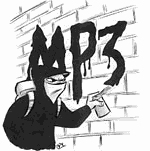EVERY FEW YEARS THE media paints a new picture of the record industry in crisis. During the ’90s, the travails began with the decline of grunge, moved on mid-decade to a precipitous sales drop-off, and concluded with the consolidation of the major labels.
We began the new millennium with another crisis du jour: digital downloading. Napster and MP3 and copyright and piracy— all very serious issues, with a certain impact on the record biz. But lost amid all the Time and Newsweek covers, the CNN special reports, is the fate of those artists who aren’t Metallica (a band whose members can, conveniently, complain about the threat of Napster on their way to the bank to deposit seven-figure checks). Seismic shifts in the industry—some related to the media-hyped crises, some more complex and perhaps sociological—have ushered in the most bizarre and imperiling era since rock ‘n’ roll began. Musicians who don’t wear pig masks and thrash out chords on oddly shaped guitars while slinging fake excrement around an arena might as well give up trying to find an audience—unless they happen to be an 18-year-old bombshell with a dramatic voice and a reputation that kept them off the cheerleading squad.
In this age of Slipknot, Limp Bizkit, Britney, and Christina, the term “career musician” may just be an anachronism. Major label singer-songwriters of the ’90s are today’s struggling independents, from Jill “I Kissed a Girl” Sobule to 1999 Oscar nominee Aimee Mann to eccentric veteran Robyn Hitchcock to the respected Canadian pop singer and guitarist Ron Sexsmith. All have recorded albums for labels in the shrinking Universal/Warner Bros./Sony/BMG sphere, and all are now on their own. Except for one guy: An amiable Brit who lives in Ballard and goes by the name John Wesley Harding.
A FEW DAYS BEFORE John Wesley Harding releases his latest album, The Confessions of St. Ace, “Wes,” as he’s known around town, meets me at Hattie’s for a late afternoon pint. He’s just back from a solo tour across the US opening for Jimmie Dale Gilmore, during which he took a break to perform on Late Night with Conan O’Brien, and he’s excitedly talking—in the Queen’s English—about getting to play on national TV. Then he’s off on another topic. Then another.
Trying to follow a cohesive line of conversation with Wes is like sliding behind the wheel after guzzling six cups of Caffe Vita’s house blend: Going straight and steady is out of the question. The 35-year-old singer-songwriter, whose graying temples counter his youthful, wide-eyed expression, is particularly amped because after years of label snafus and battling the music biz beast, he’s secured the backing of Universal-distributed Mammoth Records, which afforded him the luxury of recording in a glitzy Nashville studio. At a time when his peers busily construct Web sites to try to sell their latest self-released albums (if they’re not putting down their instruments altogether and getting day jobs), Wes is gearing up for his biggest brush with success since a 1995 tour opening for his hero Bruce Springsteen, and for his most promising album since leaving Sire/Warner Bros. in 1992.
And yet for all his excitability and sudden good fortune, Wes maintains a degree of humility; he’s aware that the market for 35-year-old pop singers is treacherous. “I want all good songwriters to make money and have success,” he says. “I want ME to make money and have success. But the good news is that I’m not a particularly greedy person. And apparently, I have enough to sustain myself and get by.”
He may soon have more. Even rarer today than a singer- songwriter with a major label album is a singer-songwriter whose major label album generates advance notice. His performance on Conan—he played the highly melodic song “She’s a Piece of Work”—has led to prerelease radio airplay. Another of the songs from The Confessions of St. Ace, the gospel-inspired “I’m Wrong About Everything,” is featured in the John Cusack film High Fidelity and is on its soundtrack. The guest musicians on St. Ace will extend its appeal; they include Gilmore—who lends his distinctive tenor to the rollicking rocker “Bad Dream Baby”—and Steve Earle, as well as Seattle fixture Scott McCaughey, whom Wes credits with facilitating the label deal that brought this album to fruition.
Wes also credits McCaughey, Kurt Bloch, and a host of other locals for helping him straighten out a career that had started to drift. In 1998 Wes moved to Seattle from San Francisco, in the midst of a label deal gone awry. He had signed to the New York indie Zero Hour, which released two of his albums in rapid succession—a tribute to English folk artist Nic Jones, Trad Arr Jones, and a more experimental rock/pop record, Awake—and folded soon after. Though the period proved unsettling, it didn’t prevent Wes from touring, and from hopping on stage with friends whenever he was back in Seattle.
“There’s a lot of people here who like making music, who really want to do it well, and they don’t mind having fun at the same time. I admire that,” he says. Later, in a more pensive moment, he admits that these friendships were a godsend. “These people sustained me.”
AS MUCH AS THESE peers provided a crutch, it’s the workmanlike approach Wes brings to his music career that’s been the ultimate support. It’s surprising given his background. Born and raised in Hastings, a southeastern coastal town in England, Wesley Stace—his surname provides the basis for the fictional “St. Ace” of his new album’s title—would go on to become a PhD candidate at Cambridge before dropping it all to play music. He’d eventually leave his home and family—his father the classics scholar, his mother the voice teacher, and his sister, now a famous TV game show host—and settle in the US, fresh off signing a major label deal. “From the moment I played my first gig in America,” he recalls, “I knew this is where it was going to be.”
Throughout the peaks and valleys of his recording career, Wes’ one constant has been touring. He played coffeehouses and theaters, punk clubs and parties, music conferences and record-label conference rooms. Through it all, he developed a sort of credo: “I never go on late and I never come off late,” he tells me. “I’ve never blown a gig in my life. I’ve never got drunk and not played. I wasn’t ever addicted to anything except going onstage and doing my show.”
Because he usually plays solo, he says, the financial rewards keep him afloat more than record royalties ever could. Especially given the climate. In the wake of Metallica’s anti-Napster campaign, other artists have shifted the bashing to the major labels; Courtney Love (whose band Hole records for Universal/Geffen) and Matt Johnson (whose band The The records for Nothing/Interscope) have lashed out in recent months, arguing that the companies siphon any and all profits that the musicians’ recordings earn.
Wes, grateful for the support he’s received, remains upbeat; he’s even hired a band, the Radical Gentlemen, for a tour later this year. It’ll feature longtime associates Chris Von Sneidern, drummer Kevin Jarvis, lead guitarist Kirk Swan, and keyboard player Robert Lloyd, who’s also the television critic for the (Village Voice Media-owned) LA Weekly. (Only Lloyd will accompany Wes at Bumbershoot, switching to mandolin.)
While The Confessions of St. Ace features the poppiest, most confidently played songs of his career, Wes isn’t entertaining thoughts of fame and fortune. He knows what he’s good at and he’s thankful that others recognize it.
What’s his greatest gift?
“A solid touring base,” he says. “When I want to, I can go to Chicago and play to a bunch of people and go to New York and play to a bunch of people. I can go to the same place every time and the people—thank the Lord—do not fail to show up, whether I’ve put out a record on a major label or a minor label or, in fact, if I haven’t even put out a record.”
While record companies—and their accompanying crises—come and go, the fans keep showing up for John Wesley Harding.
“It’s been going on for 10 years,” he notes. “It’s not a fad. It’s not going to go away. So what you have to do is keep pushing harder. I think it’s your job to keep doing the thing you believe in because that is the body of work, and the person, that is what they’re applauding. Even if it tests people in the short term, the long term is what you must think of.”
Check this out: More Bumberstuff that you just cannot miss.






